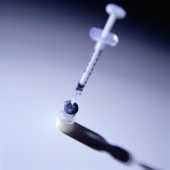
MONDAY, Nov. 18, 2013 (HealthDay News) — People routinely get vaccinations to ward off the flu or prevent infectious diseases such as measles and whooping cough. Could there be a vaccine in the future that would prevent a heart attack?
Two animal studies suggest that vaccines might someday be used to reduce high cholesterol levels and lower blood pressure, according to findings presented Monday at the American Heart Association (AHA) annual meeting in Dallas.
In both cases, the vaccines interrupt processes in the body that, if left alone, can lead to high cholesterol and elevated blood pressure.
The first study, out of Vienna, found that mice and rats had lower cholesterol levels for a year following treatment with a vaccine that protects a cell’s ability to remove “bad” LDL cholesterol from the bloodstream.
“This is one of the most exciting things that’s now under development in the controllability of cholesterol,” said Dr. James Howard, an AHA spokesperson and an endocrinologist and internist at MedStar Washington Hospital Center in Washington, D.C.
The vaccine targets an enzyme called PCSK9. This enzyme causes cells to become less able to yank LDL cholesterol from the bloodstream and convert it into hormones or other useful products, Howard said.
“When you make an antibody to it, it just can’t function,” he said of PCSK9.
By reducing the amount of active PCSK9 in a body, the vaccine also reduces the cholesterol levels as cells become more efficient in using cholesterol.
“It has incredible power to lower LDL cholesterol, and can be taken with statins,” Howard said.
Scientists note that research conducted in animals often fails to provide similar results in humans.
The second study, this one from Japan, used a different vaccine to lower high blood pressure in laboratory rats for up to six months.
This vaccine interferes with a hormone called angiotensin II, which increases blood pressure by causing blood vessels to constrict. Medications already are widely used to block angiotensin II and control blood pressure, but they have to be taken daily to be effective.
“It’s a hormone that increases blood pressure, and many of the common drugs antagonize it and reduce blood pressure,” said Barbara Howard, a senior scientist at MedStar Health Research Institute and a professor at Georgetown University Hospital, in Washington, D.C. “The idea is if you can knock out the production, you can have a sustained reduction that will last longer.”
There are some concerns about medicines or vaccines that target this hormone, however. “It’s part of a very complex network of hormones that regulate sodium balance in your body,” she said. “It has to be very tightly regulated, or it can cause damage to the whole vascular system.”
In this study, the vaccine reduced the rats’ blood pressure for months and reduced damage to the heart and blood vessels associated with high blood pressure. It also did not cause any damage to the kidneys, heart or liver.
While these findings are promising, Howard said there needs to be more study before it is ready as a vaccine for humans.
“There’s a lot of danger of overshooting and disturbing that sodium balance, and they didn’t give any real data in this report,” she said. “It’s got to be done in humans, and it’s got to be accompanied by many more measures of functional safety. If you lower it enough to affect blood pressure, can you do that without affecting sodium balance?”
At this point, the vaccine is at least five to six years away from human trials, according to study co-author Dr. Hiroshi Koriyama of Osaka University, in Japan.
There likely will be a similar amount of time needed to bring the cholesterol vaccine to human trials, said AHA spokesperson Dr. James Howard.
However, he noted that human trials now are taking place for another form of the cholesterol vaccine that has to be taken every couple of weeks by injection.
In the meantime, the AHA recommends eating a heart-healthy diet, getting weekly aerobic and muscle-strengthening activity, and avoiding tobacco smoke as good ways to help control cholesterol.
Because the studies were presented at a medical meeting, the data and conclusions should be viewed as preliminary until published in a peer-reviewed journal.
More information
For more information on treatment of high cholesterol, visit the American Heart Association.
Copyright © 2026 HealthDay. All rights reserved.

